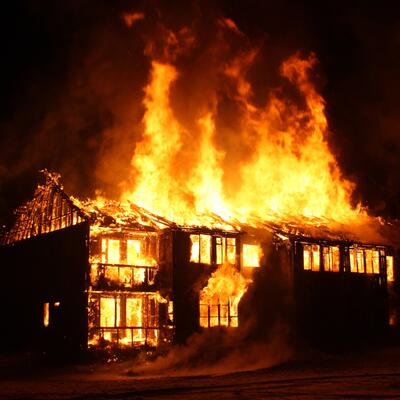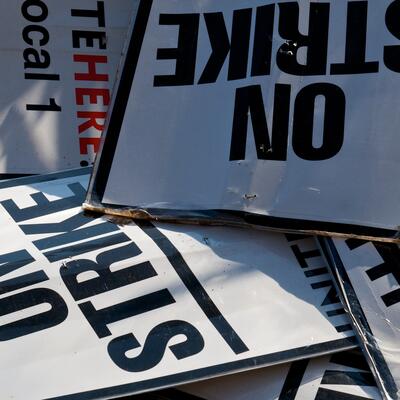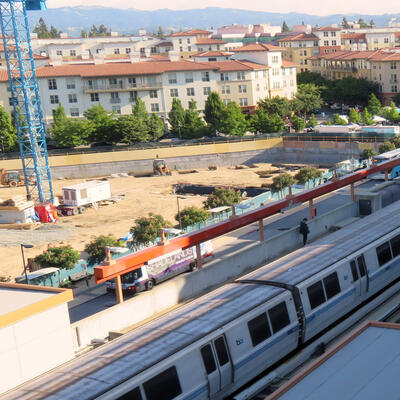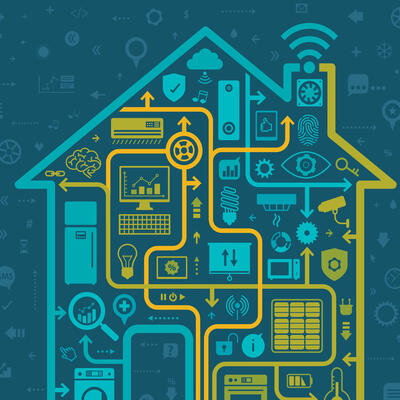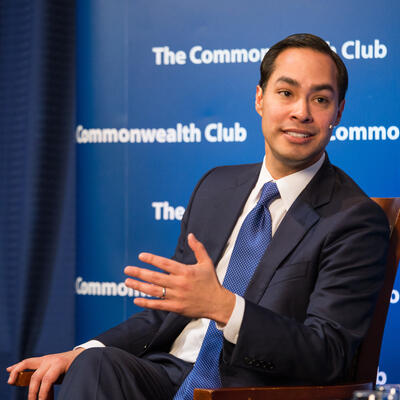
Julián Castro: Energy Efficiency and Building Power
Guests
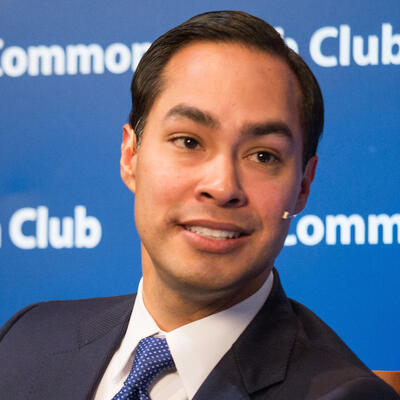
Julián Castro
Summary
The new American Dream is an energy-efficient home in a healthy, green community, and HUD Secretary Julián Castro wants to make it affordable for everyone.
Julián Castro, Secretary, U.S. Department of Housing and Urban Development (HUD)
Full Transcript
Greg Dalton: From the Commonwealth Club of California this is Climate One, changing the conversation about America's energy economy and environment. I'm Greg Dalton. My guest today is Julian Castro U.S. Secretary of Housing and Urban Development. People wanting to go solar no longer need a stack of hundred dollar bills in their hand. Companies selling solar rooftops will now install the systems with zero cash down and some homeowners can start saving money on their electric bills on day one, but stalled incomes are making it hard for first-time buyers to get into the housing market and clean energy is still considered by many to be a luxury for the comfortable classes. Over the next hour we will talk the Secretary Castro about how all Americans can participate in the clean energy economy that creates jobs, and healthy and resilient communities. We will also talk about the American dream in the era of climate change and what cities can do to build a cleaner form of capitalism. In 2009 Julian Castro was elected Mayor of San Antonio at the age of 34, becoming the youngest mayor of a Top 50 American city. In 2012 he gained national recognition when he became the first Hispanic to give the keynote address at the Democratic National Convention. Please welcome Julian Castro to the Commonwealth Club.
[Applause]
Julian Castro: Thank you. Thank you.
Greg Dalton: Secretary Castro welcome.
Julian Castro: Thanks for having me.
Greg Dalton: So clean energy, electric cars, solar, that's often thought of for people who are affluent in America. How can all Americans participate in the clean energy economy?
Julian Castro: That’s a great question. First, thank you Greg and everyone here at the Commonwealth Club for having me today. It’s special to be here for the last program that you are going to have here at this location. I was here two years ago.
Greg Dalton: That’s right, with your brother.
Julian Castro: Folks may recall, yes. And it’s great to be back. You’re right that oftentimes when a lot of Americans think about energy efficiency they think about being environmentally responsible, folks tend to think that well that something for people that have a lot of resources, driving electric car or installing rooftop solar. The fact is that the declining cost of solar and the declining cost of being energy efficient in general is making that more and more affordable for middle-class Americans and folks of modest means. Today, I'm in San Francisco because we announced a HUD and State of California pilot project for PACE which is Property Assessed Clean Energy, to encourage owners of multifamily buildings, basically apartment buildings to install green retrofits in those apartment buildings. Because we know that a quarter of Americans live in multifamily buildings and that if we were able to achieve a 20% reduction in energy consumption that would save 7 billion dollars in energy costs and be the equivalent of getting 7 million cars off the road annually. Those multifamily buildings are not, by and large, luxury apartments, they are where middle-class families live, people of modest means live, because these are HUD assisted residential buildings. It's through that kind of partnership and through cities that are doing weatherization on houses, making investments in infrastructure in smart ways, that people of all economic classes are being impacted by this. So it really is a new era where everyone can participate in combating climate change.
Greg Dalton: And is this program going to involve taxpayer subsidies? How is this program going to work to make it affordable because a lot of people think that renters are left out of the green economy because they can't make their landlord do it, they don't have a particular meter or the landlord doesn't care, so how is it going to work?
Julian Castro: Well, it’s a combination of financing. Some of that the financing actually is private financing paid by these multifamily building owners. The MacArthur Foundation is also investing 10 million dollars in this so you have a public-private partnership. And generally these PACE projects are assessed on property tax bills and so the investment is paid for over time, financed over time on their property tax bills. In addition to that California is pursuing a pilot project called On-Bill Repay that is not assessed through your property tax bill but is actually assessed through your utility payment. That's how it's financed over time.
Greg Dalton: One of the biggest things in retrofits or upgrades that happened in this country in a very long time was the stimulus act, the American Recovery Act.
Julian Castro: True.
Greg Dalton: Four billion dollars went to HUD, five billion to Department of Energy. Some of that money was criticized for not being spent effectively efficiently; weatherization states couldn't spend the money in the time that was required. You weren’t in federal government then, but what have you learned from some of the problems of the Stimulus Act to make sure that the federal government gets it right this time?
Julian Castro: Well, you know, I was a mayor during that time period and I think the biggest lesson is just first of all that you need very good coordination from Federal through the State down to the local level. You need excellent planning because I think sometimes what I saw were there were at times challenges with the planning that was not in place. But I think, by and large, we can say now with the benefit of hindsight that the ARRA [American Recovery and Reinvestment Act] funds made a huge impact in getting our national economy back up to speed. And when it comes to just what HUD did, you know, there were 13.6 billion dollars that were invested in housing and 1.8 million homes that became greener because of those investments. So, this is tangible. It is helping to combat climate change, improving the economy, and also making an impact on the lives of middle-class families and folks of modest means.
Greg Dalton: You mentioned your time during mayor you did a fair number things as mayor, worked on some -- pulled some coal plants, you pulled out of a nuclear plant, bike sharing. One thing that didn't happen was specific goals for reducing San Antonio. It’s the seventh largest city in the country. I didn't realize that until I looked it up last night.
Julian Castro: Yeah.
Greg Dalton: But you didn’t make specific goals like San Francisco and other cities did. Why not?
Julian Castro: You're right, that wasn't something that was part of the approach. You know, I think that my hope is that San Antonio will. It was not accomplished during that timeframe but my hope is that the city will in the future.
Greg Dalton: And what do you plan to do at HUD other than this sort of program for multifamily dwellings. What are your other plans for making federal housing more energy efficient, cleaner and greener?
Julian Castro: Sure. HUD is doing a lot. You know, we have a Better Buildings challenge. The President has challenge multifamily building owners out there to reduce their energy consumption by 20% by 2020. And we have now, I think, something like 81 owner, actually it’s 87 now because we announced six more today, 87 owners of multifamily properties across the nation that constitute 380,000 households, 400 million square feet of property, that have signed on that better buildings challenged and it's making a significant difference. You talked about, for instance in the single-family context, FHA does have a product that allows folks to essentially work in the cost of retrofitting their home as a loan product that is insured by FHA that can go to 110% of the value of the property. So, there's a multitude of ways that HUD has been involved in encouraging energy efficiency. We also have a goal of 100 megawatts of on-site renewables in federally assisted housing, so this is public and subsidized housing, by 2020 and right now were about halfway there and making good progress. And then the last thing I would just mention that folks may be familiar with is our national disaster resilience competition. We're investing a billion dollars in a competition among states and cities that had a national disaster declaration between 2011 and 2013 to give us their most creative plans on how they can become more sustainable resilient communities and be better prepared next time for a Hurricane Sandy or a Hurricane Katrina, and be thoughtful about it. And later this year will announce the winners of that.
Greg Dalton: So resilience is a big thing and it’s a big part of your portfolio. You know after a disaster there’s an inclination for communities that want to rebuild the way they were before. But the federal government is starting to say, well you can’t exactly built that house on the Jersey Shore the way it was, because you know it's going to get hit again. So how are you balancing restoring communities while also preparing for what the future’s going to bring?
Julian Castro: Well, let me kind of untangle that for second. I think that the challenge has actually been over time -- historically the challenge was that there was not enough thought given to if there has been a natural disaster, be it a hurricane, tornado, that that we have to go in and fund with FEMA money or with community development block grant disaster recovery money from HUD, generally the position had been just rebuild it the way that it was before.
Greg Dalton: That’s what people want.
Julian Castro: That's what they're used to. But there wasn't as much forward thinking about, you know, how can we redo the infrastructure in a way that creates more resilience for the future? So, around the two-year anniversary of Hurricane Sandy for instance I was on Long Island, I visited New York and also New Jersey and got to see some of the work that they are doing to think about when they rebuild their water sewage treatment plants, for instance, or rebuild houses that came down because of Hurricane Sandy. How can they use CDBG-DR money in a smart way to not just rebuild what they had before but make it more resilient so that the next time they face that natural disaster they’re able to withstand it. I think one of the lasting legacies of the Obama administration is going be the work that it has done to spur creativity through this national disaster resilience competition and before it, after Hurricane Sandy, something called Rebuild By Design that was really a precursor to this in conjunction with the Rockefeller Foundation and Secretary Shaun Donovan did, I think, just a great job in getting that off the ground.
Greg Dalton: So how's that happening with Governor Christie in New Jersey? Is that happening? Is New Jersey rebuilding in a way that's going to prepare for the next one or is it kind of still built on the old shore?
Julian Castro: No. I think it's fair to say that each of those States that were impacted by Sandy have shown good progress in terms of rebuilding in a smarter way. That's still a work in progress frankly, but they have made good progress.
Greg Dalton: Scientists say we can expect more severe weather in the future and yet cities like Miami and others are still a lot of waterfront development happening. Some people are concerned, I interviewed former New Jersey Governor Whitman who said at some point Uncle Sam can't always be there to bail out these cities and states. So how do you think that's going to play out at some point where something -- a couple of Sandys that 60 billion dollar Federal taxpayers paid to recover for that. Is there going to be a point where Uncle Sam can't write a big check to the states, and say sorry you should’ve been ready for this?
Julian Castro: Well, our hope is that through the investments that we’re making now and the example that these communities that are participating in Rebuild by Design in the National Disaster Resilience Competition, the example that they’re setting will set best practices that are then adopted by states throughout our country. I don't believe that there's going come a time where after a natural disaster the federal government says you're on your own. I mean that has not historically been the practice of the federal government. However, I do think that we’re looking for stronger partnership from states and from private and non-profit players on how can we do this in a way that will mean that these communities are just able to withstand one of these natural disasters better so that we don't have to spend, we don't have to invest the same level of resources next time. We’re not going to walk away once it's happened. But what we want to do is invest now so that we won't have to spend those resources in the future and the quality of life can be better for residents because they’re able to withstand it next time.
Greg Dalton: Does that create what's called the moral hazard if a developer thinks, well I can build in this wetland and yeah a hurricane might come but government’s going to bail me out, I won't be liable. Does that create, sort of incentivize risky behavior?
Julian Castro: No, I don't believe so. At least it hasn’t been my experience as someone who went through local government that folks think about it necessarily in that way, you know. Usually when folks do their development, they’re doing their development for their own private reason, for gain, but I don't think they’re thinking in the future people are going to bail me out necessarily. And that hasn’t been our focus. Our focus is ensuring that we make the right investments so that the communities are more sustainable and they can withstand natural disasters better in the future.
Greg Dalton: Natural disasters happen all sorts of way. They happen quickly. They can also unfold slowly. Texas is in the year -- the fourth year or so of a drought that's among the biggest in the last 500 years. Many scientists would say these are the kinds of things we can expect more in the future. So how is the drought affecting Texas, and are people connecting it to climate change?
Julian Castro: Greg, why are you picking on Texas? California's in a drought too.
[Laughter]
Greg Dalton: We like to pick on Texas. We’re envious of your San Antonio Spurs.
Julian Castro: You know, today I walked up to the podium with Governor Brown and I was walking up, I said oh I’m glad to be here in California. He said, “Oh, you’re glad to be here you’re from Texas, you’re talking about California as a leader!” Which I was, California is a leader on these issues and very good. But to answer your question, you're right, I mean it's not just buildings and infrastructure, it's all of this goes together. So, for Texas, we’re having the second worst drought on record since the 1950’s.
San Antonio is the largest American city that relies on an underground aquifer as its primary source of water. So in San Antonio for instance the best way that I can describe that city is that it learned the hard way and it has now taken on this culture of conservation there. Let me put that in concrete terms. In the mid-1980’s the number of gallons of water used per customer of the San Antonio water system per day, or back there was a city water board, it was not its own entity, was about 202 gallons per day. Today, it's probably around 135 or 140. So, if you were to look at like 1985, 1986, 87, in that San Antonio water system, the entire system, they're using about the same amount of water then as they were 2011, 2012. And it wasn't just conservation. It was also direct water recycling efforts; it was storing aquifer water so that you can use it then, you know, when you need it later. You know, we are looking more and more at the water-energy nexus, because as folks know the utilities use each other's product more than anybody else. You know, the electric utility uses water more than anybody else and the water utility uses electricity often times more than anybody else. So, if you can do joint projects and reduce both those at the same time that really is the pay dirt in terms of sustainability and all of that is going on in San Antonio. It's one of the best kept secrets in terms of effectiveness when it comes to combating the drought.
Greg Dalton: Another area of pay dirt in Texas is fracking. It’s a very water intensive process. Do you have a view on fracking?
Julian Castro: Yeah, I mean I think like most folks I've watched out there in terms of the concerns about it. I would be lying to you if I said that I don't have any concerns and want to ensure that in the long term that it is done in a safe way. I'm not against it, I’ve not come out against it, but I do recognize that there needs to continue to be research to ensure that it's done in a safe way. Most recently, you know, folks may have seen about three or four weeks ago there was a series of small earthquakes in the, I think it was the Irving area of North Texas. How does that happen and people not say well okay, you know, you got to just try and understand what is going on here. Is that linked to fracking in North Texas? All of those are very legitimate questions. But I do believe, you know from the evidence that I have gone through and read, that it can be done safely. People disagree with that. There are people that don't believe that it should be done. I haven't come to that view on it.
Greg Dalton: So you’re not for a ban on fracking but for proper fracking with strong government oversight?
Julian Castro: Yeah, with strong government oversight. Also I think that some of the legislation in Texas with regard to transparency around the chemicals that are used makes very basic sense to me. I think that the oversight on it the research on it has to be neutral and not funded by industry, and that makes a difference. So, like I said I believe that there is a utility to it and that it has a strong economic value, that natural gas is an important component of our energy future and at the same time keeping an open mind as research continues to come in.
Greg Dalton: This is Climate One from the Commonwealth Club and our guest is Julian Castro, Secretary of the U.S. Department of Housing and Urban Development. I'm Greg Dalton. There's been a big change in the energy landscape. 40-dollar oil [unintelligible] 100 dollars, how has that affected Texas? How has that affected the prospects for clean energy when dirty energy is so cheap all of a sudden?
Julian Castro: Well for Texas, folks may remember of course that Texas went through quite a recession in the 1980’s as we saw energy drop precipitously and the big question lately has been with the huge plummet in the price of oil are we going to see that again in Texas? I do think that Texas is going to feel effect of that. I think fortunately for the state, the economy of Texas has diversified significantly since the 1980’s and so it's not as dependent on the oil and gas economy, but it is going to feel the effect of it, it just probably won't be nearly to the same extent that it was in the 1980’s. You’re not going to see -- I don't believe you’re going to see that kind of impact because the state has just diversified beyond it and it has to continue to diversify.
My main critique of Texas is that, you know, a lot of those guys knock California all the time but what California got right historically was that it invested in brainpower. It invested in being innovative and educating people through the university system. And if you compared the public university system in California to the public university system in Texas, historically California's was much stronger. And that was really, you know, I think what California did well in the 20th century and what Texas in the 21st century is not getting right in the way that it needs to get right. Because brainpower as I've said many times and I said last time when I was here, I really believe that that's the currency of success in 21st century global economy.
Greg Dalton: It’s nice to hear a Stanford grad endorse Cal here at California.
[Laughter]
Julian Castro: I should’ve worn my Cardinal red sweater I had on yesterday.
Greg Dalton: One thing you tried to do as mayor of San Antonio is get a California company, Tesla, to come to San Antonio. Tell us about that and what that would’ve done to diversify San Antonio, and also the job prospects of electric cars and moving away from oil.
Julian Castro: Well, I mean I’m a fan Tesla like I imagine a lot of folks are. I think they put out a good product. Obviously it's cleaner for our environment. That would've represented -- and it will for Reno, Nevada -- a great investment, I think of a 5-billion dollar facility with several thousand jobs directly created and many more probably over time. So, a fantastic environmental impact writ large and a great local economic impact.
Greg Dalton: They paid a lot per job to get that.
Julian Castro: They did, they did and I wouldn't disagree with that. I mean there is a debate about the effectiveness of economic development incentives. Certainly in Texas there has been. And in fact the new governor Greg Abbott just announced that he wants to do away with one of the economic development incentive funds, the technology incentive fund, that Governor Perry had, and that didn't end up actually creating that many jobs or really that much research in the state.
Greg Dalton: I actually sat down with Governor Perry when he was out here courting Tesla, drove a Tesla right up to the of the statehouse in Sacramento. How do you think, how you judge Rick Perry's term as governor of Texas?
[Laughter]
Julian Castro: I think that a fair assessment from, obviously, my perspective would be that it was just a big missed opportunity. That again, I believe what that state needs to do is to prepare for the future by investing in brainpower and investing in segments of the economy that are growing. And it's getting it. I've described it as like two sides of a coin, and there's a shiny side. The shiny side is what you hear all the time about the number of jobs created in Texas, which is true. I mean, it created a lot of jobs in Texas and generally have done better than one state. They knock California all the time as being the high costs, anti-business state, and in a state with a lot less regulation and that is more "business friendly” there's a lot more investment. But what Governor Perry did not get right is investing in what my brother has called the infrastructure of opportunity in strong schools and strong universities. In making sure that people of different walks of life can prosper and be a part of the American dream. We really didn't to my mind we didn't make much progress in those 15 years of preparing for the 21st century in the long run.
Greg Dalton: A lot of those jobs created were low-wage jobs. You talk about people participating in the American dream. Immigration was a topic you touched on here last time. What are the prospects for some immigration progress during the final years of the Obama administration?
Julian Castro: I’m very proud of the President and what he has done on immigration, that he's taken this strong step with his executive action to fix what I think all of us wherever you are on that issue understand is a broken immigration system right now. And as you all know we had bipartisan support for legislation in the Senate on immigration. It made it through the Senate, I think with 57 votes -- no, 68 votes -- and then got into the house and the speaker John Boehner invoked the Hastert Rule, which basically says that only if a majority of the governing party supports it will it actually get a vote on the House floor. And so they withheld that, it never got its vote in terms of this session. I believe that that the President has laid out a series of steps that make sense that hopefully will spur Congress to action. I do think that that the pressure on Republicans is going to get higher as we get closer to 2016 to resolve this issue, because I think it's going to make a difference in the 2016 election if they don't do anything positive. So, I'm hopeful that something can get done but I'm also not holding my breath.
Greg Dalton: And a lot of that concern is driven by attracting Latino votes, right? People look at that voting block as they will be paying a price if they don't do something for that voting bloc.
Julian Castro: They look at it as Latino votes in 2016, really also Asian-Americans are a huge component of that and Asian-Americans now are growing I think faster, at a faster rate.
Greg Dalton: But still a bit smaller part of the population.
Julian Castro: Still a much smaller part but if you look, I think four cycles from now or eight cycles from now, you know, the stories that you are reading I think about the Latino community are going to be written about the Asian-American community in the future in the United States. And that's also a community that I believe understands how important it is to resolve this issue of our broken immigration system and in the 2012 election, you know, you all have seen the figures. I mean, Hispanics voted at 71% for President Obama and Asian-Americans voted 73% for President Obama. And so that issue is not cordoned off to one demographic I think.
Greg Dalton: President Obama ran saying he would end the partisan gridlock in Washington D.C. -- didn't happen. What can change that, the partisan gridlock in Washington?
Julian Castro: My brother told me just a snippet. A really interesting story. My brother Joaquin, we’re twins. He calls me the uglier twin. But he started Congress in the 2012 session. He said something very fascinating about the very first day that he got there. He said that like when you go there all the materials that you have to pick up are on separate tables from the beginning and that in the first orientation that they have, they have it separately, the Democrats and the Republicans. And he's described it as the entire infrastructure of the place is designed for fighting. Like, you're separated; you know it doesn't encourage collegiality or getting to know people. Also the schedule that they’re on. He said that they were in session 98 days in 2014. That they were only in session 98 days.
Greg Dalton: Because they’re out busy raising money.
Julian Castro: Well, whatever they’re doing. I mean, what it means is, you'll get there on Monday and then leave on Thursday. So, I mean you’re there and then you’re mostly back home. But you're not forming those kinds of relationships that I think have been formed more in the past.
So to get your question, I think it's gonna take looking in a deeper way at how those relationships are fostered and structured in the Congress. I believe that what we've seen is an economic comeback in the United States as well. You know, unemployment rate at 5.6%, the housing market is rebounding, over 11 million new jobs created over 58 months. The president is in a stronger position, I believe, today, to get bipartisan support from Congress and so I’m hopeful that he will.
Greg Dalton: Not so sure they’re gonna give him much anything this last part of his term. But the to the part about members of Congress spending a lot of time in their district -- it used to be they spent more time in D.C., they would have cocktails together, famous story about Tip O'Neill and Ronald Reagan shouting names at each other than having a scotch. Do you ever knock back a few beers with Republicans in Washington?
Julian Castro: Look, I don't drink. So, I mean you know.
Greg Dalton: I apologize. Knock back a few ice teas then.
Julian Castro: I’ll bring my ice tea. That's one of my pet peeves about the northeast is that it’s impossible to get like good iced tea and good barbeque. You know, and I think that the President has not gotten nearly enough credit for how active the White House is in inviting members of Congress to all different sorts of meetings and events. And the fact is that oftentimes folks are invited and they decline the invitation to go. And some of them say, well you know they can’t be seen at the White House or with the President because they're afraid of what will happen with their base. But this notion that that there's no attempt at fostering relationships from the White House -- there has been a very strong attempt consistently by the President. And for the reasons of political concern in their home districts a lot of folks just haven’t responded.
Greg Dalton: Our guest today at Climate One at the Commonwealth Club is Julian Castro, Secretary of the U.S. Department of Housing and Urban Development, I'm Greg Dalton. You can join the conversation on Twitter and also listen to a podcast in iTunes. If not much is going to happen in Washington, a lot of climate people think that cities are where the action is going to be. You’ve been a mayor, what can cities do as important actors to really drive resilience, cut greenhouse gases and kind of really move forward when not a lot is happening nationally or internationally?
Julian Castro: Cities can do a lot. In fact, just recently there were 16 Champions of Climate communities that were recognized, and actually San Francisco was one of those. I think Sonoma County was another one that created a district focused on climate change. San Francisco has set -- and I think this is what cities can do -- set goals across the board, you know, whether it deals with water, renewable, energy efficiency, the use of infrastructure in smart ways. Cities can adopt policies that have the effect of making them more resilient and lowering their emissions and I think preparing for climate change more strongly.
Greg Dalton: One person who’s spoken out quite vociferously recently on climate change is Pope Francis. Your colleague Gina McCarthy was recently invoking the Vatican. You’re Roman Catholic, how do you see Pope Francis' stance on climate change and climate as a moral issue?
Julian Castro: Well, I’m a fan of this pope. I think he has done just a wonderful job of articulating, I know personally why I'm Catholic. Some of the things that is I've grown up as Catholic I was most attracted to was social justice and a concern for people who are poor and basically concern for everybody. With regard to climate change, I mean I don't see a conflict as part of the faith on that issue.
Greg Dalton: Between the science and the faith, because some people do say that it is blasphemous for humans to think they can change God's creation. We can't do that, only God can.
Julian Castro: I don't feel that conflict, you know, I don't see it. And recently we saw that 2014 was the hottest year ever recorded. And I believe it makes sense to not just question what's happening here but how can we do something positive about it.
Greg Dalton: The people who will suffer the most will be poor people, vulnerable communities, vulnerable countries. People in the Pacific Islands, Bangladesh did very little to contribute to greenhouse gases. It's our lifestyle that’s created that. They don't have the resources, also poor communities in the U.S. So, how do you think about vulnerable poor communities and their ability to sort of adapt to things that they didn't create?
Julian Castro: I think you're right that it takes, as we look at this in terms of a global scale, that it takes some understanding where different nations are and the quality of life that exists in different nations. That's why I was encouraged recently to see the forward progress that the President made with China so that you see for the first time that China looks to be taking climate change seriously and be willing to do something about it in a reasonable timeframe. That gives me hope that, you know, whether it’s for China or one of the countries that you mentioned, that we can come together and make a strong global effort to combat climate change.
Greg Dalton: Do you ever have moments of looking at the climate science and have moments of fear, it’s like whoa lump in the stomach, this could be really bad?
Julian Castro: Yeah, I believe that if you're someone who has confidence in science and you look at the analysis that’s coming from very well respected scientists, how as a human being can you not think about the future that your grandchildren and your great-grandchildren are going to have, and also think about the responsibility that we have to do something about it now while there's more of an opportunity to perhaps improve that future. So sure that does make me think.
Greg Dalton: You have a one-month-old son and a daughter who is 4 or 5, they could very well live into the 22nd century to 2100 which is --
Julian Castro: Now you're making me feel --
Greg Dalton: That’s a big number, but that’s what a lot of scientists talk about. It’s not just hypothetical, it’s very real.
Julian Castro: Sure.
Greg Dalton: So how does that inform your thoughts about science and climate being a parent?
Julian Castro: I think as most folks who are parents and grandparents here, I think it's sad all the time. It’s almost cliché but it's true. It just make things real for you, it's not just you. It makes your thinking about the future more personal and more substantive for you as a human being, thinking about what world your children and then their children are going to inherit. And that's why for me, when I hear that 2014 was the hottest year on record, and you listen to the scientists about climate change it becomes something that you feel compelled to do something about. Not just in general but for the people that you care about the most. So, I think it should give it should give all of us more impetus to do something.
Greg Dalton: When you come across people that deny climate change in Texas or anywhere else, how do you engage with them?
Julian Castro: I think making the argument. I’m a lawyer by training and the law, especially litigation, is all about everybody has an argument, everybody has their argument. And in some ways that's what folks who denied this are doing. You know, it’s just an argument, your argument, my argument. But try and point out the overwhelming weight of scientific evidence on it and also as much as possible in a respectful way to try and make it personal, to how you feel about the future that your children and your grandchildren are going to inherit, and why it means so much to get this issue right for the sake of the future.
Greg Dalton: Have you encounter people who say privately, I’m kind of concerned but I can't say it publicly because I’ll pay a political price or it will hurt my company, that sort of thing?
Julian Castro: I guess over the years maybe one or two people. You encounter that not just on that issue but different issues in public policy.
Greg Dalton: You live in Washington after all.
Julian Castro: Yeah. So, yeah, I mean from time to time you hear that. There are things that people in politics and people in business would love to be able to do that they will tell you they can’t do it for whatever reason. And sure one or two times I’ve heard that on this issue.
Greg Dalton: You've called the Department of Housing and Urban Development the department of opportunity to getting people into the American dream. The American dream is often thought of as a house with a big lawn, a couple of SUVs in the garage. Is that still attainable and desirable in an era where we have water stress and we need to get off fossil fuels? Does the American dream need to change a little bit?
Julian Castro: Well, the American dream is I think of homeownership has been homeownership. Now through what's happening with responsible private developers, these public-private partnerships, the things I mentioned that we’re doing with California, the FHA and what it's doing, those homes can be more energy-efficient homes, they can be climate friendlier homes. And so I don't see those two as mutually exclusive. I think that hopefully in the years to come part and parcel of that American dream will be a home that is more energy efficient. And a good example of a community doing something responsible is Seattle. For instance, they not too long ago established a regional affordable housing fund to go and buy up plots of land near their railway system, their metro systems, to encourage transit oriented affordable housing so that people can walk to the metro station. My wife and I and our two children now live right next door to the school that our daughter goes to -- I mean right next door. Our apartment building is right next door to the school that she goes to. And about three weeks ago Erica and I were having a conversation about how much money we’re not spending on gas and how much we’re not using the car that we took from San Antonio to D.C. that is there because of the fact that we live right next to the school. So it’s still I think at its base the same American dream, but we can be smarter about the impacts on our climate when we achieve the American dream.
Greg Dalton: One other housing question I want to ask you and we’re going to go in a minute to audience questions, in 1968 Congress passed the Fair Housing Act as many American cities were in flames after riots in the wake of Dr. Martin Luther King's assassination. The law prohibits discrimination in housing based on race. There's now a court case before the US Supreme Court from Texas challenging that law. What's at stake?
Julian Castro: What's at stake essentially is whether disparate impact -- basically for folks that I'm sure many of you all know, disparate impact refers to being able to find discrimination not just where you can prove that there was intentional discrimination but where essentially you analyze the practices of a landlord or in other contexts in housing that you can show statistically that minorities have been significantly negatively impacted. There's been a disparate impact that actions have on minority communities, and the overall effect, it would be the same as intentional discrimination against those folks.
The question in front of the Supreme Court is whether under the Fair Housing Act someone can be liable for discrimination if it can only be shown through disparate impact analysis, or do you actually have to show that they intended to discriminate against somebody. If the standard becomes that you have to show that they actually intended it in every instance that means that the essentially there are going to be a lot of policies out there and practices that have the effect of keeping people out but you can’t actually go back and show that. And it's going to make it a lot harder essentially for our department to enforce fair housing and ensure that we have a level playing field for all Americans no matter -- and it's not just by race it's also if you have a disability. One of the cases that we did last year was a string of discrimination cases against women who are pregnant. So they walk into a bank to try and get a loan to buy a home, and they’re essentially told no because that lender doesn't think they’re going to go back to work after their pregnancy. So it reaches a lot of people in different circumstances and you’re right to identify that as a case that we’re watching very closely, as the Supreme Court just heard it and comes out with its opinion later in the year.
Greg Dalton: We’re talking at Climate One at the Commonwealth Club with U.S. Secretary of Housing and Urban Development Julian Castro, I’m Greg Dalton. Let’s go to our first audience question.
Female Participant: Hi, thank you. Thank you for coming today. About 20 years ago, some years ago, Congress had the Federal Insurance Administration under FEMA imposes flood insurance requirements on anyone who got federal assistance from FEMA or SBA or any place for flooded property. They were to maintain that flood that insurance on the property forever or they’d never get federal disaster assistance again. Well, with the extreme weather coming, causing more floods and stuff, what is HUD doing to help elevate or relocate the people that are in these flood plains?
Julian Castro: Thank you very much for the question. Two things, first a major part of the investment that HUD has made -- let's just take the last 10 years, in the instances for instance of Hurricane Katrina and superstorm Sandy, have been to help folks elevate their homes. The folks who’ve been impacted by these storms, so that they will be more resilient to the next one. Secondly, there is the possibility that funding that’s very flexible like CDBG funding can go in communities to that kind of work. The fact is that often times when we’re addressing these issues it's after a disaster has happened. And that’s the new approach that were taking with this natural disaster resilience competition is to challenge communities out there to be creative and come up with plans and execute them to make communities more resilient beforehand. A lot of that that investment is with general infrastructure but, you know, there are places that are helping folks elevate their homes as part of these recovery efforts and then preventative efforts.
Greg Dalton: We might also mention that Congress tried to reform that flood insurance program and then they clawed it back. Next question.
Male Participant: Tyrone Roderick Williams with the Sacramento Housing and Redevelopment Agency. My question is related to the new initiative that you just announced related to energy efficiency in public housing. As we struggle and look at opportunities for capital improvements on older developments, could you just share a little about the resources that would be made available to housing authorities to retrofit existing buildings particularly those that tend to be older properties?
Julian Castro: Yeah. I’ll give you an example of something that we’re very excited about and we have thought about how do we include energy efficiency as part of this, which you’re probably familiar with, which is a Rental Assistance Demonstration or RAD initiative. So, every year we lose about 10,000 public housing units to disrepair. And the challenge is that the investment and resources in public housing these days is just not what it used to be. Congress does not appropriate the amount of resources that it takes to keep public housing up to speed, and so much so that we have a 26 billion dollar backlog in capital investment needs in public housing. So, a very creative way to speed up investment -- and we’re looking at how we can do that in an energy-efficient way as well, encourage energy-efficient retrofit -- is to partner with the private sector so that they can finance improvements to public housing, get a return on the investment, but fundamentally still it remains a public asset for the future. And as they do that the question is, how can we do it in a way that is just not building back up to what it was before but in a greener smarter way? That's one example of how we’re trying to approach it.
Greg Dalton: We have time for a couple more questions, the secretary needs to go, let’s go to our next question. Welcome to Climate One.
Male Participant: Good afternoon Secretary Castro my name is Mario Lopez. I had the privilege of meeting you at the White House last fall as an intern and wanted to thank you for your words. As a big city mayor from San Antonio you were able to engage various communities. Within the Latino community what would you say is the best way to engage folks to work more on climate change? Sometimes I feel like we’re not seen as much as a community that’s at the forefront of climate change. Thank you Mr. Secretary.
Julian Castro: Thank you for the question. I agree with you. I think that in the Latino community this has not been an issue that folks gravitate toward, you know, in the same way as quickly. And so like other issues, I think that there's a lot of time it needs to be spent at a grassroots level helping to educate folks and making folks aware of why it's so important. And the thing is, you know that oftentimes whether it’s Latinos or African-Americans or poor whites or people of modest means, it's these folks who are most impacted by what we’re talking about today. And there's a whole field of environmental justice, of ensuring that when local decisions are made they take into account communities that have traditionally been hurt by their policies. So, to answer your question I would just say it's like anything else, I think nonprofits that are doing work out there in communities trying to reach out to the Latino community. It's a very family based, you know, culture and so utilizing that approach I think always helps. But it’s a great question that you raised because I think you're right about the connection of the community to this issue.
Greg Dalton: Climate One did a whole program on green Latinos. You can listen to the podcast in iTunes and one of the comments from a Latino leader was health, frame it as a health issue. Polar bears and glaciers that are far away don't resonate with people, but health does, often for people who are living near pollutants and communities that are affected by fossil fuels.
Let’s go to our next audience question for Secretary Castro.
Female Participant: Yes, hello my name is Royce McLemore and I am the vice president of the Golden Gate Village Resident Council public housing complex family in Marin County. Our council has developed a plan of historic preservation. We live in Frank Lloyd Wright, Aaron Green buildings. So we are moving for historic preservation, revitalization and the retrofitting that you’ve been talking about today. My question to you is what can we as a group of -- a resident council, duly elected resident council, how can we look to HUD to help us, work with us with our local housing authority to move forward with our plan.
Julian Castro: First of all my kudos to you for all the great work that it sounds like you all are doing on this issue. And one of the things that I'm excited to do is to re-energize the work that we do with resident councils in the United States. I met with I guess the main group that represents the resident councils, met with their leadership about three months ago and I'm looking forward to speaking with them again. As we work with housing authorities on these issues, whether it's rental systems demonstration or other programs in local communities, we would love to think about how we can loop in resident councils so that we ensure that we get the best ideas, a panoply of ideas, and also that we do this in a way that is sensitive to the concerns of residents, of the tenants, and we don't overlook the fact that we’re impacting their quality of life as retrofits happen, you know, sometimes people have to move because of reconstruction and renovation. So that's a very good point and were noting that that's a point to bring up when we meet with the Resident Councils Association next time.
Greg Dalton: We are out of time, with apologies to the people who are getting the signal that the secretary needs to go, with apologies to the people in line. One last really quick question, Mark McKinnon was an advisor to George W. Bush. He told the New York Times in 2010 “Julian Castro has a very good chance of becoming the first Hispanic president of the United States.” Have you heard that quote before?
[Applause]
Julian Castro: I've heard the quote before. That is such a flattering quote Greg. I thank Mark McKinnon for the quote but I seriously doubt that that’s going to be the case, so it's very flattering though.
Greg Dalton: And our thanks to Secretary Castro for being here today. I'm Greg Dalton from Climate One at the Commonwealth Club. Thank you Secretary for coming and joining us today at the Commonwealth Club.
Julian Castro: Thank you.
[Applause]
Greg Dalton: This is Climate One from The Commonwealth Club. I’m Greg Dalton. We turn now to another Texan on the national political stage: former governor Rick Perry. We heard Julian Castro mention Governor Perry’s record. Last year, when Governor Perry was still in office, I sat down with him to talk about energy, subsidies and the role of government. Here’s Rick Perry onstage at The Commonwealth Club.
Greg Dalton: One question from the audience is, how can the Republican Party ever hope to appeal to intelligent people when accepted science such as evolution and climate change are rejected by the leaders of the Party?
[Applause]
Rick Perry: There are really two questions out there. One is, you know, is the climate changing? If the climate’s changing, why is it changing? And if man’s engagement is the reason it’s occurring, then we need to have the solutions to that. If it’s not, then everything’s gonna be fine, but if it is we need to be able to have the answers to that and my great concern is that policies that are put in place in Washington D.C. that can strangle the economy of this country jeopardize our ability to innovate.
And I think that’s the bigger question, not fighting amongst ourselves or trying to push people off into corners but to recognize that America and America’s innovation, both the private sector working with the public sector, and coming up with the answers to these great challenges that we have relative to the environment. That’s our role and we cannot do it if we strangle our economy, if we put our economy at jeopardy.
Greg Dalton: Doing nothing on climate also can hurt business. Insurance companies are very concerned about droughts, crop losses, severe weather storms, more billion dollar losses. In fact, there’s something called the climate declaration, this is General Motors, Microsoft, Intel, Unilever, Starbucks, Disney have called for a coordinated effort to combat climate change, in part because of the opportunity, in part because it’s hurting business today.
Rick Perry: Then I go back to – I mean, so what’s their solution? I mean --
Greg Dalton: They didn’t – those companies [crosstalk].
Rick Perry: Okay so – please don’t stand on the sideline and tell me you need to do this and don’t have a solution. We have historically addressed the big issues that faced this country in -- I mean, excuse me have faced this world. America has been where these answers come from. We’re driven by a free market capitalistic system that has a profit motive from time to time in it. And I will suggest to you that is what we must maintain, we must preserve, we must protect that, if we’re going to find the solutions to these issues. And we have always been about coming up with innovation, selling that innovation to other places in the world or trading that innovation or showing the wisdom of using that innovation somewhere else in the world, and that’s what we need to be focused on.
Greg Dalton: Another question from the audience for Texas Governor Rick Perry. Are you in favor of the elimination of energy subsidies?
Rick Perry: I am a fan of subsidies. I think there is a role for subsidies to be played. And one of the reasons that we have been successful in Texas over the last 14 years of luring businesses to the state is because we’ve been in competition with other states and there have been subsidies that we put on the table. We said if you will come, you will create this many jobs, they meet this minimum salary structure, then we will subsidize your company this much. And, you know, I got friends who think that’s not appropriate. I do. That is the way the business world works. And I think that more government functions along the lines of how the business world works, it’s probably going to be more efficient. So we put subsidies into place to bring the wind energy into the state of Texas.
But from the standpoint of, you know subsidization for oil and gas drill and I think there is a role for that to play. I mean if we are to become energy independent and I think that’s a good thing. I think it’s good for North America to be energy independent.
Greg Dalton: Our thanks to Governor Rick Perry for our conversation about America becoming energy independent and many other social issues today. I’m Greg Dalton, and now this meeting at the Commonwealth Club of California, the place where you’re in the know, is adjourned.
